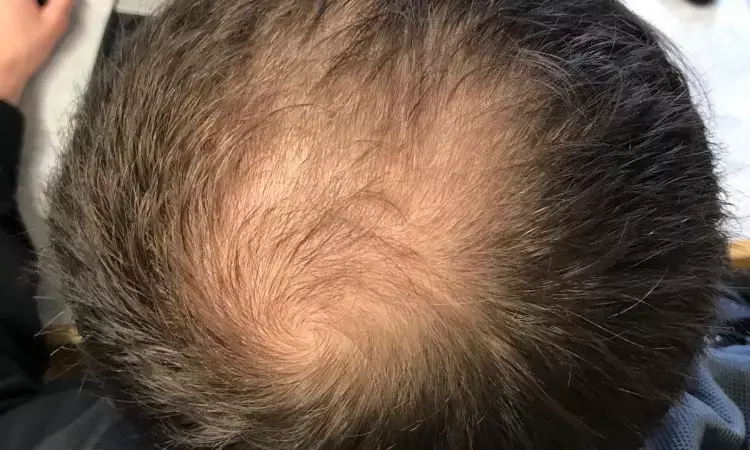- Home
- Medical news & Guidelines
- Anesthesiology
- Cardiology and CTVS
- Critical Care
- Dentistry
- Dermatology
- Diabetes and Endocrinology
- ENT
- Gastroenterology
- Medicine
- Nephrology
- Neurology
- Obstretics-Gynaecology
- Oncology
- Ophthalmology
- Orthopaedics
- Pediatrics-Neonatology
- Psychiatry
- Pulmonology
- Radiology
- Surgery
- Urology
- Laboratory Medicine
- Diet
- Nursing
- Paramedical
- Physiotherapy
- Health news
- Fact Check
- Bone Health Fact Check
- Brain Health Fact Check
- Cancer Related Fact Check
- Child Care Fact Check
- Dental and oral health fact check
- Diabetes and metabolic health fact check
- Diet and Nutrition Fact Check
- Eye and ENT Care Fact Check
- Fitness fact check
- Gut health fact check
- Heart health fact check
- Kidney health fact check
- Medical education fact check
- Men's health fact check
- Respiratory fact check
- Skin and hair care fact check
- Vaccine and Immunization fact check
- Women's health fact check
- AYUSH
- State News
- Andaman and Nicobar Islands
- Andhra Pradesh
- Arunachal Pradesh
- Assam
- Bihar
- Chandigarh
- Chattisgarh
- Dadra and Nagar Haveli
- Daman and Diu
- Delhi
- Goa
- Gujarat
- Haryana
- Himachal Pradesh
- Jammu & Kashmir
- Jharkhand
- Karnataka
- Kerala
- Ladakh
- Lakshadweep
- Madhya Pradesh
- Maharashtra
- Manipur
- Meghalaya
- Mizoram
- Nagaland
- Odisha
- Puducherry
- Punjab
- Rajasthan
- Sikkim
- Tamil Nadu
- Telangana
- Tripura
- Uttar Pradesh
- Uttrakhand
- West Bengal
- Medical Education
- Industry
Oral minoxidil vs topical minoxidil: Choosing the right treatment for male androgenetic alopecia

Brazil: For treating men with androgenetic alopecia (AGA), low-dose low-dose oral minoxidil (5 mg per day) has similar efficacy to topical minoxidil, 5%, and can be an option for patients who are intolerant to topical treatment or prefer oral therapy, a recent study has claimed.
The double-blind, placebo-controlled randomized clinical trial (RCT) comprising 90 men with androgenetic alopecia found that daily oral minoxidil, 5 mg, was well tolerated and did not show superiority over topical minoxidil, 5% after 24 weeks of treatment. The findings were published online in JAMA Dermatology on April 10, 2024.
Androgenetic alopecia is the main cause of hair loss in men. It occurs due to progressive miniaturization of the hair follicles and shortening of the anagen phase. This form of hair loss causes low self-esteem and hurts the quality of life. There has been an increased interest in low-dose oral minoxidil for AGA treatment. However, the effectiveness of oral minoxidil for male AGA has not yet been evaluated in comparative therapeutic trials.
Against the above background, Mariana Alvares Penha, São Paulo State University (UNESP), Botucatu, Brazil, and colleagues aimed to compare the safety, efficacy, and tolerability of daily oral minoxidil, 5 mg, versus twice-daily topical minoxidil, 5%, for 24 weeks in male AGA treatment.
For this purpose, they conducted a double-blind, placebo-controlled randomized clinical trial at a single specialized clinic in Brazil. Eligible men with AGA aged 18 to 55 years, were included and classified using the Norwood-Hamilton scale as 3V, 4V, or 5V.
Participants were randomized in a ratio of 1:1 into two groups: oral minoxidil, 5 mg, daily, and topical placebo solution; or 1 mL of topical minoxidil, 5%, twice daily, and oral placebo for 24 weeks. Sixty-eight completed the study among 90 enrolled participants, the mean age was 36.6 years. Thirty-three participants were enrolled in the oral minoxidil group and 35 in the topical treatment group.
The study's primary outcome was a change in terminal hair density on the vertex and frontal scalp regions. The secondary outcomes were changes in total hair density and photographic evaluation.
The study led to the following findings:
- Both groups were homogenous in terms of demographic data and AGA severity.
- For the frontal area, the mean change from baseline to week 24 between the groups was 3.1 hairs per cm2 for terminal hair density and 2.6 hairs per cm2 for total hair density.
- For the vertex area, the mean change from baseline to week 24 was 23.4 hairs per cm2 for terminal density and 5.5 hairs per cm2 for total hair density.
- According to the photographic analysis, oral minoxidil was superior to topical minoxidil on the vertex (24%) but not on the frontal scalp (12%).
- The most common adverse effects in the oral minoxidil group were hypertrichosis (49%) and headache (14%).
In conclusion, oral minoxidil did not demonstrate superiority over topical minoxidil in treating male AGA after 24 weeks. However, in the oral minoxidil group, the overall photographic improvement in the vertex was superior.
"Low-dose oral minoxidil has shown to be well tolerated and, therefore, is an option for patients intolerant to topical treatment or those who prefer oral therapy," the researchers wrote.
"By weighing the pros and cons of each treatment approach, patients can make informed decisions to address their hair loss concerns effectively," they concluded.
Reference:
Penha MA, Miot HA, Kasprzak M, Müller Ramos P. Oral Minoxidil vs Topical Minoxidil for Male Androgenetic Alopecia: A Randomized Clinical Trial. JAMA Dermatol. Published online April 10, 2024. doi:10.1001/jamadermatol.2024.0284
Dr Kamal Kant Kohli-MBBS, DTCD- a chest specialist with more than 30 years of practice and a flair for writing clinical articles, Dr Kamal Kant Kohli joined Medical Dialogues as a Chief Editor of Medical News. Besides writing articles, as an editor, he proofreads and verifies all the medical content published on Medical Dialogues including those coming from journals, studies,medical conferences,guidelines etc. Email: drkohli@medicaldialogues.in. Contact no. 011-43720751


